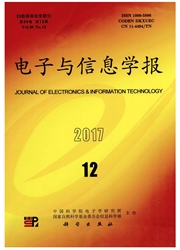

 中文摘要:
中文摘要:
研究压缩传感(Compressed Sensing, CS)的稀疏信号重构算法,该文提出一种新的算法框架阈值化迭代检测估计(Iterative Detection Estimation with Thresholding, IDET)。算法框架包括两个方面:选择单阶段阈值化(One-Stage Thresholding, OST)算法的迭代步作为支持集检测的参考;根据稀疏信号的特征设计支持集检测方法。同时,提出该算法框架的实现算法,实现算法先检测由迭代硬阈值化(Iterative Hard Thresholding, IHT)迭代步得到一个支持集,然后通过求解支持集上的最小二乘问题来估计待重构的稀疏信号,迭代上述两个步骤直至满足条件停止。IDET算法的关键在于支持集检测,该文提出3种适用于快速衰减信号的支持集检测方法。实验结果表明,IDET稀疏重构性能优于IHT的其他加速算法。
 英文摘要:
英文摘要:
This paper devotes efforts to develope sparse signal recovery algorithms for Compressed Sensing (CS). The proposed algorithmic framework is called as Iterative Detection Estimation with Thresholding (IDET). IDET takes the One-Stage Thresholding (OST) as the reference for support detection, and devises support detection methods depended on the character of sparse signals. This study presents an implementation of IDET, which detects a support set by thresholding the result of the Iterative Hard Thresholding (IHT) iteration and estimates the reconstructed signal by solving a truncated least-squares problem on the support set, and it iterates these two steps until stop condition is met. The key to IDET lies in support detection, so this study explores three support detection strategies for fast decaying signals. The experimental results show IDET exhibits superior reconstruction performance than other accelerated algorithm for IHT.
 同期刊论文项目
同期刊论文项目
 同项目期刊论文
同项目期刊论文
 Radial Basis Function Neural Network Optimized by Particle Swarm Optimization Algorithm Coupling wit
Radial Basis Function Neural Network Optimized by Particle Swarm Optimization Algorithm Coupling wit Automatic method for white matter lesion segmentation based on T1-fluid-attenuated inversion recover
Automatic method for white matter lesion segmentation based on T1-fluid-attenuated inversion recover A Video Semantic Analysis Method Based on Kernel Discriminative Sparse Representation and Weighted K
A Video Semantic Analysis Method Based on Kernel Discriminative Sparse Representation and Weighted K 期刊信息
期刊信息
